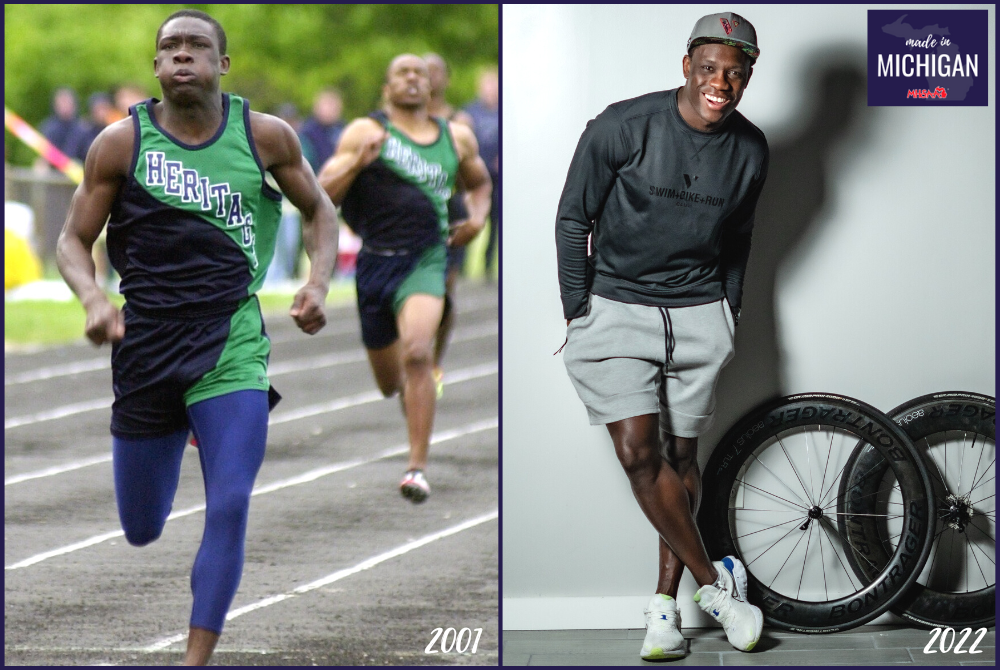
Lessons Learned on Track Have Jibowu's Business Surging to Quick Success
By
Paul Costanzo
Special for MHSAA.com
August 1, 2022
Athletics showed Soj Jibowu just how far he could push himself.
All the time spent on the track, working to become the state’s best high school 400-meter runner, and then more than that, taught him to stretch beyond what he thought were his limits.
So, when it came time to make a decision on whether to jump fully into his apparel company, Varlo, or keep it as a part-time side venture, the 2001 Saginaw Heritage graduate knew he could take himself to another level if needed.
Jibowu is the founder and CEO of Varlo, a clothing company that specializes in outfitting triathletes, but also offers casual wear for men and women. The company is just over three years old, but its clientele includes hundreds of triathletes, eight professionals, three NCAA programs and even hospitals. Merchandise is sold in eight countries.
All of that is validation for Jibowu, who took the leap to pursuing the company full-time just one year into its existence.
“When I resigned (from a medical sales job) to do this full-time, my wife was pregnant with our second child, my daughter wasn’t even walking yet,” said Jibowu, who now lives in Cherry Hill, N.J., with his wife and two young children. “Where was my state of mind to leave my very comfortable, high-paying job to pursue this – to sell clothes?”
His mind was in the same place that helped him reach tremendous heights as a runner, both at Heritage and Central Michigan University.
Jibowu, who was born in Nigeria and spent much of his childhood in Huntsville, Ala., was part of some incredible Heritage teams. He graduated a year behind eventual NFL safety Stuart Schweigert, who he ran with on the Finals-winning 1,600 relay in 2000. Another member of that relay was Derold Sligh, who won the 400-meter Finals title that year, setting the Lower Peninsula Division 1 Finals record in the process. The Hawks were LP Division 1 runners-up as a team that season.
“I ran track when I was younger, and I was terrible,” Jibowu said. “In high school, if I look back at it, I probably would have called it impostor syndrome. I think that was me up until maybe like somewhere in my senior year when I started to think, ‘I’m pretty fast.’ … I had so many dominant people around me, in my mind, I was still the slow guy.”
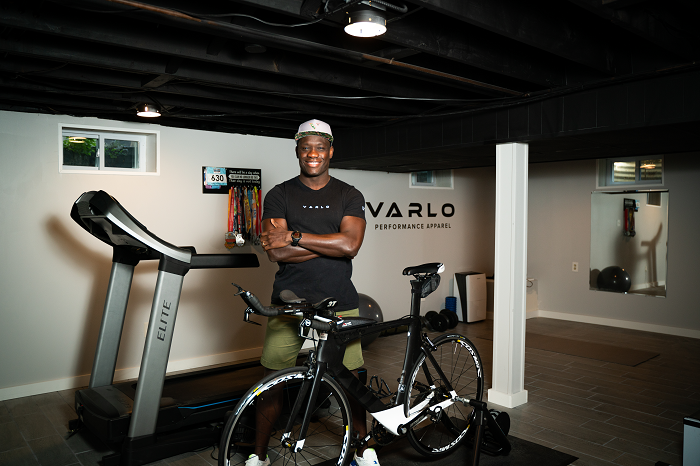 As a senior, Jibowu erased that self-doubt. He led Heritage to its first, and still only, Division 1 Finals title, running the 400 in 48.28 and breaking the record Sligh had set the year prior.
As a senior, Jibowu erased that self-doubt. He led Heritage to its first, and still only, Division 1 Finals title, running the 400 in 48.28 and breaking the record Sligh had set the year prior.
It was working to get to that point that Jibowu still credits with his ability to push himself in all things.
“I preach this all the time: if you have the ability to be involved in sports at a young age, do it,” Jibowu said. “It’s a gift, first of all. You don’t know any better when you’re young, you think you’re just training your body, but what’s really, truly occurring is you’re training your mind and building discipline. You’re building your character as far as who you are as a person. What is your will? How far are you willing to push? Am I able to be coached? Am I able to learn? Am I able to lose over and over again and keep going? Am I able to navigate to feel what it’s like to win? What you’re truly developing is how to manage and handle life.”
Jibowu said he didn’t finalize his college decision until late in the process, as he had to work on his test scores into the summer. While at CMU, he majored in biomedical science and chemistry, and he excelled, admitting he was a much better student in college than in high school.
He was also reunited with Sligh on the Chippewas track team, and had a successful career. He was regularly within the top five in the 200 and 400 in the Mid-American Conference, and won a MAC title in the 400 at the 2004 indoor championships. His personal bests in the races were 21.19 and 46.81, respectively.
After graduating from CMU, Jibowu began working as a pharmaceutical rep, then moved into medical sales.
While he remained active, it wasn’t until he took a trip to Chicago that he discovered triathlons.
“I remember seeing these really cool bikes and these really fit people, and then they jumped into Lake Michigan,” he said. “And I didn’t know that was possible, because I didn’t grow up swimming. I didn’t know that volume of people knew how to swim like that. Then they get out of Lake Michigan, jump on their bikes and they’re flying. Then they’re sprinting a 6K and I remember thinking, ‘Oh my God, these guys are the real freaking deal.’ I was hooked and wanted to start competing.”
As he began competing, the wheels for his current venture began turning. At this point, Jibowu was living out east and had worked for a pair of successful start-ups in the medical industry. That helped give him knowledge, and confidence, to make his own moves.
“I had always been into clothes and fashion, and how you express yourself with what you wear,” Jibowu said. “There was an opportunity there. The sport of triathlon is as old as me; it started in (1983). That’s a baby. That’s like basketball without the 3-point line. There’s so much opportunity for innovation.”
With that, Varlo was born, and it has since thrived, with Jibowu and the lessons he learned on a track in Saginaw paving the way.
“If you are in high school and have the ability to be in a sport, it’s a gift,” he said. “At that young of an age, truly learning to manage the trials and tribulations of life. That is a gift.”
2021-22 Made in Michigan
July 28: Running Set Life's Stage for Grosse Pointe South's Record-Setting Meier Sisters - Read
July 25: 2005 Miss Basketball DeHaan Cherishing Newest Title: 1st-Time Mom - Read
July 21: Championship Memories Still Resonate with St. Thomas Star Lillard - Read
July 14: Portage Central Champ Rolls to Vanderbilt, Writing Next Chapter in Alabama - Read
July 12: Coaching Couple Passing On Knowledge, Providing Opportunities for Frankfort Wrestlers - Read
June 30: Hrynewich's Star Continuing to Rise with Olympic, Pro Sports Arrivals - Read
PHOTOS (Top) At left, Heritage’s Soj Jibowu wins the 400 meters during the 2001 Saginaw Valley League championship meet. At right, Jibowu is the founder and CEO of the Varlo clothing company. (Middle) Jibowu’s company specializes in outfitting triathletes, and he has taken up the sport after a successful college track & field career. (Heritage photo courtesy of Saginaw News/MLive; current photos courtesy of Soj Jibowu.)
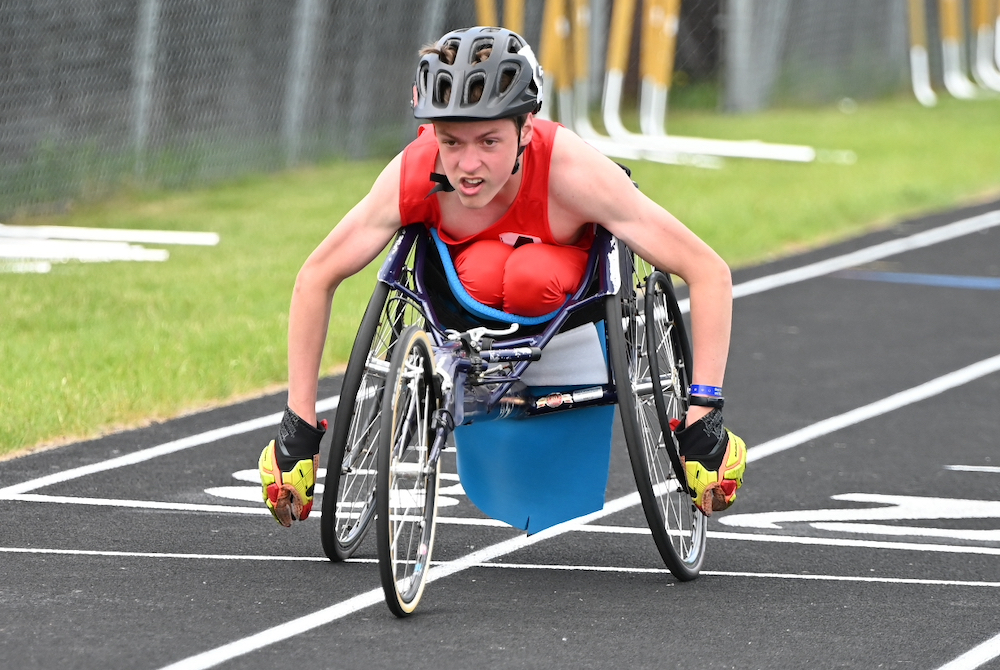
3 Upper Peninsula Athletes Among History-Makers in 1st Finals Adaptive Events
By
John Vrancic
Special for MHSAA.com
June 17, 2022
KINGSFORD — A trio of Upper Peninsula wheelchair athletes were among five statewide who concluded their seasons June 4 competing in first-time adaptive events at MHSAA Finals.
 This spring, the MHSAA Track & Field Regionals and Finals included its first adaptive 100, 200 and 400-meter dashes and shot put.
This spring, the MHSAA Track & Field Regionals and Finals included its first adaptive 100, 200 and 400-meter dashes and shot put.
“Learning the technique and staying motivated is very challenging,” Houghton senior Maria Valet said after the Western Peninsula Athletic Conference meet May 31 at Calumet. “I go to regional competition downstate and in Indiana and Wisconsin. I also do little bit of weight training, but practice mostly on the track. I also work a little bit with Dean Juntunen (a longtime wheelchair racer from Ontonagon), who gives me some pointers. It’s good to have something to work for and see other people do it.”
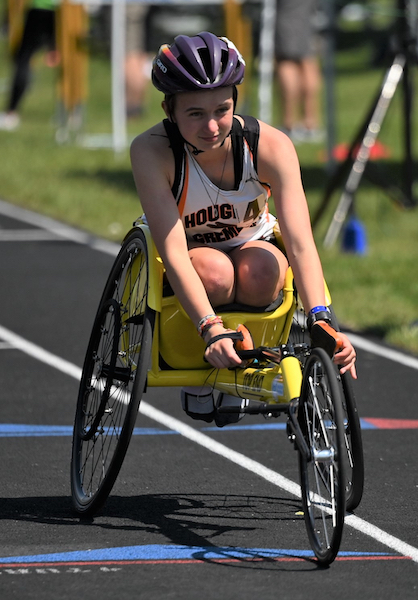 Joining Velat at the Upper Peninsula Finals in Kingsford were Marquette freshman Jim Bennett and Sault Ste. Marie freshman Johnny Osborn.
Joining Velat at the Upper Peninsula Finals in Kingsford were Marquette freshman Jim Bennett and Sault Ste. Marie freshman Johnny Osborn.
Velat covered the 100 in 26.56 seconds, 200 (51.15) and 400 (1:35.96) and recorded a 10-foot toss in shot put.
Her effort in the 400 at the Finals was nearly a personal-best.
“My best time in the 100 is 25.7 and I’ve done the 200 in approximately 48 seconds,” she said. “I think the 100 is my hardest event because it’s harder to gain momentum.”
Velat will attend the University of Michigan and major in biology. She will also be on the track team.
Bennett shattered his previous best time in the 200 by more than 2½ seconds was clocked at 24.31 in the 100 and 1:39.74 in the 400.
“It feels real good to race against other people,” he said. “I haven’t had the opportunity to do this before. There are so many opportunities available. Colleges are looking for wheelchair racers.
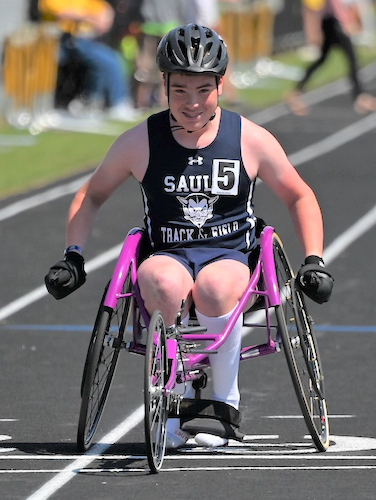 “Today was my best time in the 200 (47.52). It feels great to do that. I had my best time in the 100 (23.15) in Marquette. The longer distances are more challenging for me. Right now I’m building up.”
“Today was my best time in the 200 (47.52). It feels great to do that. I had my best time in the 100 (23.15) in Marquette. The longer distances are more challenging for me. Right now I’m building up.”
Osborn threw the shot 13-4 at Kingsford, missing his personal best by just two inches.
“It means a lot to me to get a chance to compete,” he said. “This helps bring out the competitive spirit. I do cross country, which gives me more endurance and definitely helps me for track. I also manage the basketball team at our school.”
Osborn finished the 100 in 33.18, 200 in 1:17.95 and 400 in 2:21.03.
In the Lower Peninsula, Chelsea junior Jacob Nelson competed in the Division 2 100 meters, and Grosse Pointe Woods University Liggett junior Jacob Juip competed in the Division 3 100 and 200.
 John Vrancic has covered high school sports in the Upper Peninsula since joining the Escanaba Daily Press staff in 1985. He is known most prominently across the peninsula for his extensive coverage of cross country and track & field that frequently appears in newspapers from the Wisconsin border to Lake Huron. He received the James Trethewey Award for Distinguished Service in 2015 from the Upper Peninsula Sportswriters and Sportscasters Association.
John Vrancic has covered high school sports in the Upper Peninsula since joining the Escanaba Daily Press staff in 1985. He is known most prominently across the peninsula for his extensive coverage of cross country and track & field that frequently appears in newspapers from the Wisconsin border to Lake Huron. He received the James Trethewey Award for Distinguished Service in 2015 from the Upper Peninsula Sportswriters and Sportscasters Association.
PHOTOS (Top) Marquette's Jim Bennett races during the UP Finals on June 4. (Middle) Houghton's Maria Velat competed in all four adaptive Finals events in UPD1. (Below) Sault Ste. Marie's Johnny Osborn also competed in all four events at Kingsford. (Photos by Cara Kamps/Run Michigan.)

